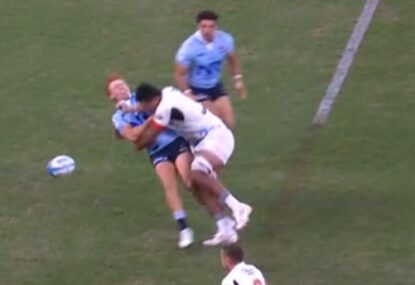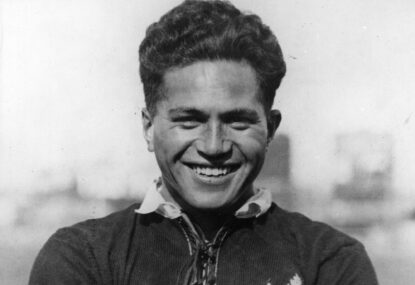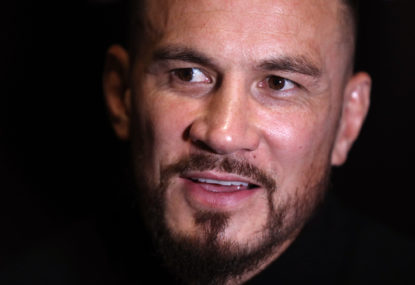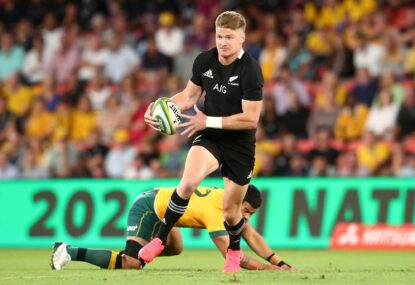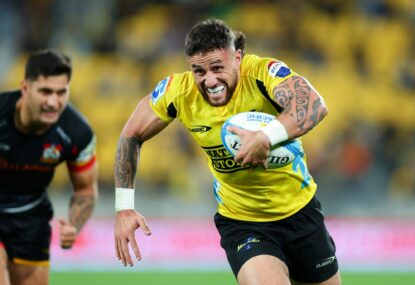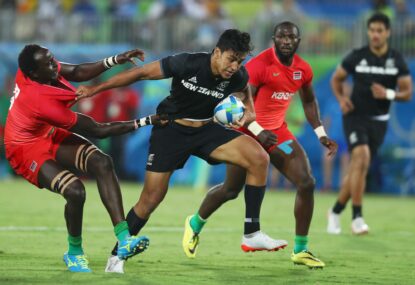Part six of our ten part series looking at the greatest All Blacks of all time, ranked in order from 100 to 1…
50. Sir Fred Allen (1946-1949 – 21 matches)
The All Blacks’ greatest ever coach, every Test played under his stewardship was won. But as a player he was a five-eighth of tremendous quality.
Winston McCarthy described him as one of the greatest sidesteppers, off either foot and, “there can be no doubt that in blindside play there was never his equal. A fine leader of men, he rose to the rank of Captain during World War II and captained the All Blacks in every match he played.”
49. Andy Haden (1972-1985 – 117 matches)
At his peak he was unequalled in the world as a front of the lineout jumper. His technique in scrimmaging, allied with his vast experience in all facets of the game, assisted many All Black sides and he was deceptively quick around the field. He also made three successful challenges for the Ranfurly Shield and played 157 matches for Auckland during 16 seasons.
48. Ron Hemi (1953-1960 – 46 matches)
Truly revolutionised the hooker’s game in New Zealand. At 1.83m and 90kg, he was big for a hooker of his era, and an exceptional athlete. In his early days in the game had played most of his rugby as a back and, as evidence of his all-round sporting prowess, he was an opening bat in first-class cricket as a 17 year old for Auckland.
His performances on the 1953/54 tour were described as astounding and over the next five or six years there was little argument that Hemi was New Zealand’s foremost hooker.
47. Peter Whiting (1971-1976 – 56 matches)
The well-proportioned Whiting was regarded as the best lineout forward of his time. A fierce competitor, and expert gatherer of kick offs, he ranks among the best locks the country has had.
Between 1971 and 1976 he dominated lineouts against the finest the other rugby nations could provide. He had speed for a man of his size and possessed superb ball skills. Another feature of his play was his punting ability which could often be put to use with the ‘mark anywhere’ laws of his era.
46. Murray Mexted (1979-1985 – 72 matches)
Making his debut in 1979 and scoring one of the most spectacular tries ever by an All Black, he then went on to establish a stranglehold on the No. 8 jersey for the next six years.
At 1.93m and 97kg, he was a superb lineout forward, a smart and forceful defender and possessed excellent handling skills. Was an integral part of All Black attacks from scrums, lineouts and second phase play.
45. Gary Knight (1977-1986 – 66 matches)
It is a tribute to Knight that the strength and technique of the All Black scrum was never questioned during his time in the black jersey. Winning a bronze medal at the 1974 Commonwealth Games as a wrestler, Knight based his game around scrummaging and mauling but he steadily built a good all-round style.
The bulk of Knight’s provincial career was with Manawatu and when he retired at the end of the 1986 season he had played 145 matches for the union, which remains the record.
44. Stu Wilson (1976-1983 – 85 matches)
A brilliant, intuitive three-quarter who became known as the ultimate finisher, Wilson had the speed and elusiveness to beat the best-organised defences. He was probably at his peak in the 1981 season, where he scored eight tries in eight Test matches, several of which were classics in the famous series win over the Springboks.
One of the few players to score 50 or more tries for the All Blacks, he broke Ian Kirkpatrick’s Test try scoring record with a hat-trick against the Lions in 1983.
43. Carl Hayman (2001-2007 – 46 matches)
By the end of the 2007, Hayman was generally seen as the world’s best tighthead prop and one of the best New Zealand has produced in the position. Many scrum authorities generally rate him second only to the legendary strong man of the 1960s, Ken Gray.
Hayman’s virtues were a strong scrummaging technique, surprising mobility and nous in the open and considerable ability as an effective lifter. All Blacks front rows during the mid 2000’s were rarely bettered with Hayman anchoring the scrum.
42. Johnny Smith (1946-1949 – nine matches)
It was not entirely Smith’s fault that he had such an abbreviated Test record. Injuries, apartheid and war affected his opportunities and while he never quite achieved astonishing deeds for the All Blacks, he still had many feats to his credit which enhanced his legend, especially for North Auckland and the 1945-46 ‘Kiwis’ Army team.
In his biography, Bob Scott, Smith’s team-mate in the Kiwis, said of Smith, “I have seen a good many three quarters of all nations and I will say simply that Smith was the best of the lot, bar none.”
Smith’s impeccable, inspired play at centre rates among the greatest ever produced in New Zealand. His only peers have probably been Bert Cooke of the years before World War II and, in more recent years, Bruce Robertson.
41. Fergie McCormick (1965-1971 – 44 matches)
One of the finest performers in one of the great eras of All Blacks history. There were few more indomitable figures in the game and the stockily-built pocket battleship became celebrated for his fearless tackling. He was also one of the first running fullbacks, possessing a startling turn of pace.
Never more than a reluctant goal kicker, he became the first player to pass 2000 first-class points and in a Test match against Wales in 1969 set an individual points scoring world record.





























































































